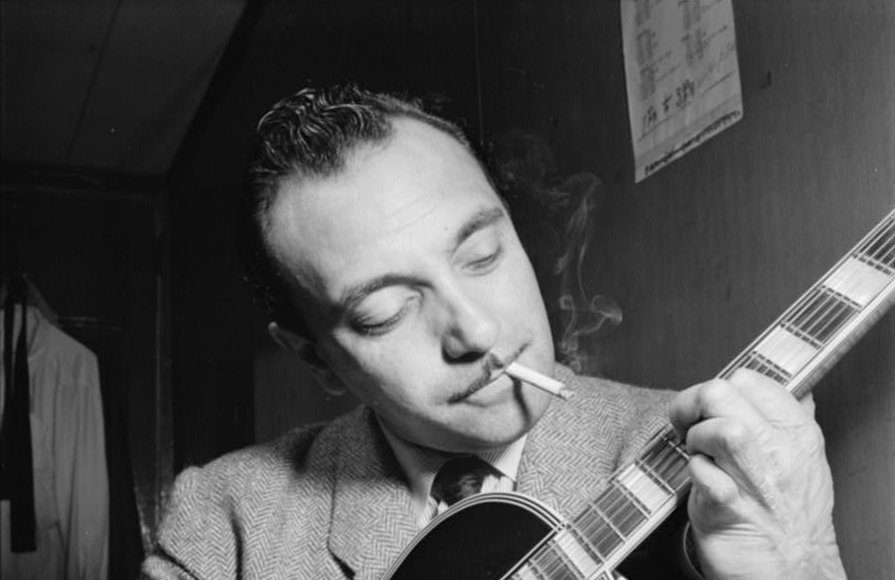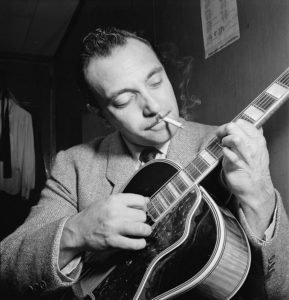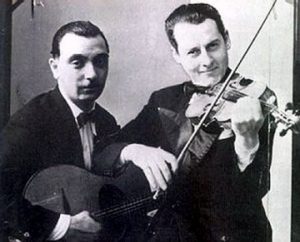by Greg Pollner
“The only reason God allowed Django to Die is because his son needed guitar lessons“
The enigmatic Django REINHARDT – demonstrating his complex approach to his music. This photo was taken backstage in New York in 1946
Stephane Grappelli, French jazz violinist and co-founder of the
Quintette du Hot Club de France.
Have you heard of Django Reinhardt before? This is a question I always ask people when discussing music. Many guitar players, in particular, have heard of Django at one point, because he is known by musical historians as the founding father of lead guitar – specifically, the use of the guitar for Solo’ing.
Django Was born in 1910, into a Tribe of Romanov Gypsies who referred to themselves as The Romanies, who’s roots could be traced back to India. The guitar was considered a very important instrument to the Romanies and most in the tribe were, on some level, proficient with one instrument or another. Though, this is not to Romanticise the lives of the gypsies in Europe: it was an extremely tough life at times. A gypsy had to know many skills, including entertainment if he or she were to make a decent go of things. As such, Django spent much of his youth mastering the guitar until his left hand (fretting hand) was crippled in a Caravan fire. The injuries were so severe the doctors wanted to amputate, luckily Django was alert enough to stop them following through with it. Despite losing the use of two of his fingers, Django took great pains to learn the guitar all over again. Through what would have been agonizing practice sessions and intense, dedicated work devising new methods of tuning, he wound up becoming, in his time, the most celebrated guitarist who had ever lived.
In fact not many people are aware that Django inspired Tony Iommi, lead Guitarist of Black Sabbath, to continue playing guitar, despite losing the tips of his fingers in an accident as well. Previous to this time, the Guitar as a lead instrument was used only for campfire entertainment, because the guitar, without amplification, was always too quiet for that purpose in larger settings.
Django came in at a perfect time when people were discovering how to amplify instruments and voice. Also at this time, Jazz was beginning to make its way from America into Europe, and when Django heard it for the first time, it changed the direction of his life, and arguably, the history of western music. With the help of his back up band, which included a brother on Rhythm guitar, and one Stephane Grapelli – a brilliant French violinist whom Django enlisted to create what we know today as Gypsy jazz.
Of course, all of this is amazing in and of itself, but what made Django a truly awe-inspiring Guitarist, was the way he used the guitar to express himself with such purity. With blinding speed he seemed to put all of his feelings into every single moment of his improvisational guitar playing. Not to compare genres, but one thing that made Django, and other great jazz players, so special is that there was no “pretending” in it.
Where many Rock music or rap groups have to, on some level, stick to certain difficult and rigid formulae, Django’s form of jazz has an extremely wide range of emotional content.
There are many truly interesting things to discuss about this accomplished man, but I found that it was especially very rewarding, after falling in love with his music, to learn more about his history in bits and pieces. A song that first comes to mind can only be summed up as cheeky. “You Rascal” and “Lime House Blues” are very quick and upbeat tunes, which feature some of Stephan Grapelli’s best work. Minor Swing is also one of my personal favourites, because the entire thing can be broken down to three chords: Am Dm and Emaj, thus making it one of the easier songs to play along to with an any instrument, though what they do with it is incredibly technical.
It’s entirely worthwhile investing a little time in discovering this incredible man, amazing musician and infinitely important piece of musical history. And I hope that, if you do, it enriches your life as much as it has mine.









